- Home
- Leo Tolstoy
Family Happiness and Other Stories Page 2
Family Happiness and Other Stories Read online
Page 2
I somehow felt that with him it was impossible to refuse or to say beforehand that I played badly: I sat down obediently at the piano and began to play as well as I could; yet I was afraid of criticism, because I knew that he understood and enjoyed music. The adagio suited the remembrance of past days evoked by our conversation at tea, and I believe that I played it fairly well. But he would not let me play the scherzo. “No,” he said, coming up to me; “you don’t play that right; don’t go on; but the first movement was not bad; you seem to be musical.” This moderate praise pleased me so much that I even reddened. I felt it pleasant and strange that a friend of my father’s, and his contemporary, should no longer treat me like a child but speak to me seriously. Katya now went upstairs to put Sonya to bed, and we were left alone in the parlor.
He talked to me about my father, and about the beginning of their friendship and the happy days they had spent together, while I was still busy with lesson-books and toys; and his talk put my father before me in quite a new light, as a man of simple and delightful character. He asked me too about my tastes, what I read and what I intended to do, and gave me advice. The man of mirth and jest who used to tease me and make me toys had disappeared; here was a serious, simple, and affectionate friend, for whom I could not help feeling respect and sympathy. It was easy and pleasant to talk to him; and yet I felt an involuntary strain also. I was anxious about each word I spoke: I wished so much to earn for my own sake the love which had been given me already merely because I was my father’s daughter.
After putting Sonya to bed, Katya joined us and began to complain to him of my apathy, about which I had said nothing.
“So she never told me the most important thing of all!” he said, smiling and shaking his head reproachfully at me.
“Why tell you?” I said. “It is very tiresome to talk about, and it will pass off.” (I really felt now, not only that my dejection would pass off, but that it had already passed off, or rather had never existed.)
“It is a bad thing,” he said, “not to be able to stand solitude. Can it be that you are a young lady?”
“Of course, I am a young lady,” I answered, laughing.
“Well, I can’t praise a young lady who is alive only when people are admiring her, but as soon as she is left alone, collapses and finds nothing to her taste—one who is all for show and has no resources in herself.”
“You have a flattering opinion of me!” I said, just for the sake of saying something.
He was silent for a little. Then he said: “Yes; your likeness to your father means something. There is something in you . . . ,” and his kind attentive look again flattered me and made me feel a pleasant embarrassment.
I noticed now for the first time that his face, which gave one at first the impression of high spirits, had also an expression peculiar to himself—bright at first and then more and more attentive and rather sad.
“You ought not to be bored and you cannot be,” he said; “you have music, which you appreciate, books, study; your whole life lies before you, and now or never is the time to prepare for it and save yourself future regrets. A year hence it will be too late.”
He spoke to me like a father or an uncle, and I felt that he kept a constant check upon himself, in order to keep on my level. Though I was hurt that he considered me as inferior to himself, I was pleased that for me alone he thought it necessary to try to be different.
For the rest of the evening he talked about business with Katya.
“Well, good-bye, dear friends,” he said. Then he got up, came towards me, and took my hand.
“When shall we see you again?” asked Katya.
“In spring,” he answered, still holding my hand. “I shall go now to Danilovka” (this was another property of ours), “look into things there and make what arrangements I can; then I go to Moscow on business of my own; and in summer we shall meet again.”
“Must you really be away so long?” I asked, and I felt terribly grieved. I had really hoped to see him every day, and I felt a sudden shock of regret, and a fear that my depression would return. And my face and voice must have made this plain.
“You must find more to do and not get depressed,” he said; and I thought his tone too cool and unconcerned. “I shall put you through an examination in spring,” he added, letting go my hand and not looking at me.
When we saw him off in the hall, he put on his fur coat in a hurry and still avoided looking at me. “He is taking a deal of trouble for nothing!” I thought. “Does he think me so anxious that he should look at me? He is a good man, a very good man; but that’s all.”
That evening, however, Katya and I sat up late, talking, not about him but about our plans for the summer, and where we should spend next winter and what we should do then. I had ceased to ask that terrible question—what is the good of it all? Now it seemed quite plain and simple: the proper object of life was happiness, and I promised myself much happiness ahead. It seemed as if our gloomy old house had suddenly become full of light and life.
Chapter II
Meanwhile spring arrived. My old dejection passed away and gave place to the unrest which spring brings with it, full of dreams and vague hopes and desires. Instead of living as I had done at the beginning of winter, I read and played the piano and gave lessons to Sonya; but also I often went into the garden and wandered for long alone through the avenues, or sat on a bench there; and Heaven knows what my thoughts and wishes and hopes were at such times. Sometimes at night, especially if there was a moon, I sat by my bedroom window till dawn; sometimes, when Katya was not watching, I stole out into the garden wearing only a wrapper and ran through the dew as far as the pond; and once I went all the way to the open fields and walked right round the garden alone at night.
I find it difficult now to recall and understand the dreams which then filled my imagination. Even when I can recall them, I find it hard to believe that my dreams were just like that: they were so strange and so remote from life.
Sergey Mikhaylych kept his promise: he returned from his travels at the end of May.
His first visit to us was in the evening and was quite unexpected. We were sitting in the veranda, preparing for tea. By this time the garden was all green, and the nightingales had taken up their quarters for the whole of St. Peter’s Fast in the leafy borders. The tops of the round lilac bushes had a sprinkling of white and purple—a sign that their flowers were ready to open. The foliage of the birch avenue was all transparent in the light of the setting sun. In the veranda there was shade and freshness. The evening dew was sure to be heavy on the grass. Out of doors beyond the garden the last sounds of day were audible, and the noise of the sheep and cattle, as they were driven home. Nikon, the half-witted boy, was driving his water-cart along the path outside the veranda, and a cold stream of water from the sprinkler made dark circles on the mould round the stems and supports of the dahlias. In our veranda the polished samovar shone and hissed on the white table-cloth; there were cracknels and biscuits and cream on the table. Katya was busy washing the cups with her plump hands. I was too hungry after bathing to wait for tea, and was eating bread with thick fresh cream. I was wearing a gingham blouse with loose sleeves, and my hair, still wet, was covered with a kerchief. Katya saw him first, even before he came in.
“You, Sergey Mikhaylych!” she cried. “Why, we were just talking about you.”
I got up, meaning to go and change my dress, but he caught me just by the door.
“Why stand on such ceremony in the country?” he said, looking with a smile at the kerchief on my head. “You don’t mind the presence of your butler, and I am really the same to you as Grigori is.” But I felt just then that he was looking at me in a way quite unlike Grigori’s way, and I was uncomfortable.
“I shall come back at once,” I said, as I left them.
“But what is wrong?” he called out after me; “it’s just the dress of a young peasant woman.”
“How strangely he looked at me!” I sai
d to myself as I was quickly changing upstairs. “Well, I’m glad he has come; things will be more lively.” After a look in the glass I ran gaily downstairs and into the veranda; I was out of breath and did not disguise my haste. He was sitting at the table, talking to Katya about our affairs. He glanced at me and smiled; then he went on talking. From what he said it appeared that our affairs were in capital shape: it was now possible for us, after spending the summer in the country, to go either to Petersburg for Sonya’s education, or abroad.
“If only you would go abroad with us—” said Katya; “without you we shall be quite lost there.”
“Oh, I should like to go round the world with you,” he said, half in jest and half in earnest.
“All right,” I said; “let us start off and go round the world.”
He smiled and shook his head.
“What about my mother? What about my business?” he said. “But that’s not the question just now: I want to know how you have been spending your time. Not depressed again, I hope?”
When I told him that I had been busy and not bored during his absence, and when Katya confirmed my report, he praised me as if he had a right to do so, and his words and looks were kind, as they might have been to a child. I felt obliged to tell him, in detail and with perfect frankness, all my good actions, and to confess, as if I were in church, all that he might disapprove of. The evening was so fine that we stayed in the veranda after tea was cleared away; and the conversation interested me so much that I did not notice how we ceased by degrees to hear any sound of the servants indoors. The scent of flowers grew stronger and came from all sides; the grass was drenched with dew; a nightingale struck up in a lilac bush close by and then stopped on hearing our voices; the starry sky seemed to come down lower over our heads.
It was growing dusk, but I did not notice it till a bat suddenly and silently flew in beneath the veranda awning and began to flutter round my white shawl. I shrank back against the wall and nearly cried out; but the bat as silently and swiftly dived out from under the awning and disappeared in the half-darkness of the garden.
“How fond I am of this place of yours!” he said, changing the conversation; “I wish I could spend all my life here, sitting in this veranda.”
“Well, do then!” said Katya.
“That’s all very well,” he said, “but life won’t sit still.”
“Why don’t you marry?” asked Katya; “you would make an excellent husband.”
“Because I like sitting still?” and he laughed. “No, Katerina Karlovna, too late for you and me to marry. People have long ceased to think of me as a marrying man, and I am even surer of it myself; and I declare I have felt quite comfortable since the matter was settled.”
It seemed to me that he said this in an unnaturally persuasive way.
“Nonsense!” said Katya; “a man of thirty-six makes out that he is too old!”
“Too old indeed,” he went on, “when all one wants is to sit still. For a man who is going to marry that’s not enough. Just you ask her,” he added, nodding at me; “people of her age should marry, and you and I can rejoice in their happiness.”
The sadness and constraint latent in his voice were not lost upon me. He was silent for a little, and neither Katya nor I spoke.
“Well, just fancy,” he went on, turning a little on his seat; “suppose that by some mischance I married a girl of seventeen, Masha, if you like—I mean, Marya Aleksandrovna. The instance is good; I am glad it turned up; there could not be a better instance.”
I laughed; but I could not understand why he was glad, or what it was that had turned up.
“Just tell me honestly, with your hand on your heart,” he said, turning as if playfully to me, “would it not be a misfortune for you to unite your life with that of an old worn-out man who only wants to sit still, whereas Heaven knows what wishes are fermenting in that heart of yours?”
I felt uncomfortable and was silent, not knowing how to answer him.
“I am not making you a proposal, you know,” he said, laughing; “but am I really the kind of husband you dream of when walking alone in the avenue at twilight? It would be a misfortune, would it not?”
“No, not a misfortune,” I began.
“But a bad thing,” he ended my sentence.
“Perhaps; but I may be mistaken . . .” He interrupted me again.
“There, you see! She is quite right, and I am grateful to her for her frankness, and very glad to have had this conversation. And there is something else to be said”—he added: “for me too it would be a very great misfortune.”
“How odd you are! You have not changed in the least,” said Katya, and then left the veranda, to order supper to be served.
When she had gone, we were both silent and all was still around us, but for one exception. A nightingale, which had sung last night by fitful snatches, now flooded the garden with a steady stream of song, and was soon answered by another from the dell below, which had not sung till that evening. The nearer bird stopped and seemed to listen for a moment, and then broke out again still louder than before, pouring out his song in piercing long-drawn cadences. There was a regal calm in the birds’ voices, as they floated through the realm of night which belongs to those birds and not to man. The gardener walked past to his sleeping-quarters in the greenhouse, and the noise of his heavy boots grew fainter and fainter along the path. Someone whistled twice sharply at the foot of the hill; and then all was still again. The rustling of leaves could just be heard; the veranda awning flapped; a faint perfume, floating in the air, came down on the veranda and filled it. I felt silence awkward after what had been said, but what to say I did not know. I looked at him. His eyes, bright in the half-darkness, turned towards me.
“How good life is!” he said.
I sighed, I don’t know why.
“Well?” he asked.
“Life is good,” I repeated after him.
Again we were silent, and again I felt uncomfortable. I could not help fancying that I had wounded him by agreeing that he was old; and I wished to comfort him but did not know how.
“Well, I must be saying good-bye,” he said, rising; “my mother expects me for supper; I have hardly seen her all day.”
“I meant to play you the new sonata,” I said.
“That must wait,” he replied; and I thought that he spoke coldly.
“Good-bye.”
I felt still more certain that I had wounded him, and I was sorry. Katya and I went to the steps to see him off and stood for a while in the open, looking along the road where he had disappeared from view. When we ceased to hear the sound of his horse’s hoofs, I walked round the house to the veranda, and again sat looking into the garden; and all I wished to see and hear, I still saw and heard for a long time in the dewy mist filled with the sounds of night.
He came a second time, and a third; and the awkwardness arising from that strange conversation passed away entirely, never to return. During that whole summer he came two or three times a week; and I grew so accustomed to his presence, that, when he failed to come for some time, I missed him and felt angry with him, and thought he was behaving badly in deserting me. He treated me like a boy whose company he liked, asked me questions, invited the most cordial frankness on my part, gave me advice and encouragement, or sometimes scolded and checked me. But in spite of his constant effort to keep on my level, I was aware that behind the part of him which I could understand there remained an entire region of mystery, into which he did not consider it necessary to admit me; and this fact did much to preserve my respect for him and his attraction for me. I knew from Katya and from our neighbors that he had not only to care for his old mother with whom he lived, and to manage his own estate and our affairs, but was also responsible for some public business which was the source of serious worries; but what view he took of all this, what were his convictions, plans, and hopes, I could not in the least find out from him. Whenever I turned the conversation to his affairs, he frowned
in a way peculiar to himself and seemed to imply, “Please stop! That is no business of yours”; and then he changed the subject. This hurt me at first; but I soon grew accustomed to confining our talk to my affairs, and felt this to be quite natural.
There was another thing which displeased me at first and then became pleasant to me. This was his complete indifference and even contempt for my personal appearance. Never by word or look did he imply that I was pretty; on the contrary, he frowned and laughed, whenever the word was applied to me in his presence. He even liked to find fault with my looks and tease me about them. On special days Katya liked to dress me out in fine clothes and to arrange my hair effectively; but my finery met only with mockery from him, which pained kind-hearted Katya and at first disconcerted me. She had made up her mind that he admired me; and she could not understand how a man could help wishing a woman whom he admired to appear to the utmost advantage. But I soon understood what he wanted. He wished to make sure that I had not a trace of affectation. And when I understood this I was really quite free from affectation in the clothes I wore, or the arrangement of my hair, or my movements; but a very obvious form of affectation took its place—an affectation of simplicity, at a time when I could not yet be really simple. That he loved me, I knew; but I did not yet ask myself whether he loved me as a child or as a woman. I valued his love; I felt that he thought me better than all other young women in the world, and I could not help wishing him to go on being deceived about me. Without wishing to deceive him, I did deceive him, and I became better myself while deceiving him. I felt it a better and worthier course to show him the good points of my heart and mind than of my body. My hair, hands, face, ways—all these, whether good or bad, he had appraised at once and knew so well, that I could add nothing to my external appearance except the wish to deceive him. But my mind and heart he did not know, because he loved them, and because they were in the very process of growth and development; and on this point I could and did deceive him. And how easy I felt in his company, once I understood this clearly! My causeless bashfulness and awkward movements completely disappeared. Whether he saw me from in front, or in profile, sitting or standing, with my hair up or my hair down, I felt that he knew me from head to foot, and I fancied, was satisfied with me as I was. If, contrary to his habit, he had suddenly said to me as other people did, that I had a pretty face, I believe that I should not have liked it at all. But, on the other hand, how light and happy my heart was when, after I had said something, he looked hard at me and said, hiding emotion under a mask of raillery:

 The Death of Ivan Ilych
The Death of Ivan Ilych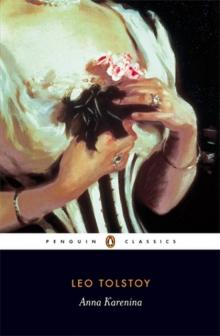 Anna Karenina
Anna Karenina Resurrection
Resurrection Family Happiness
Family Happiness War and Peace
War and Peace The Cossacks
The Cossacks The Kreutzer Sonata
The Kreutzer Sonata A Confession
A Confession The Kingdom of God Is Within You
The Kingdom of God Is Within You Father Sergius
Father Sergius Childhood, Boyhood, Youth
Childhood, Boyhood, Youth Lives and Deaths
Lives and Deaths The Devil
The Devil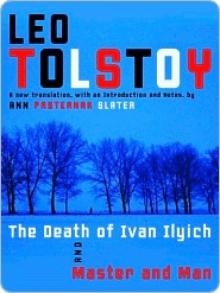 The Death of Ivan Ilyich and Master and Man
The Death of Ivan Ilyich and Master and Man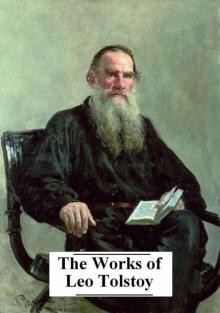 The Complete Works of Leo Tolstoy (25+ Works with active table of contents)
The Complete Works of Leo Tolstoy (25+ Works with active table of contents)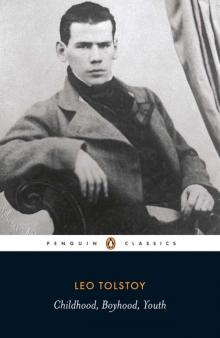 Childhood, Boyhood, Youth (Penguin ed.)
Childhood, Boyhood, Youth (Penguin ed.)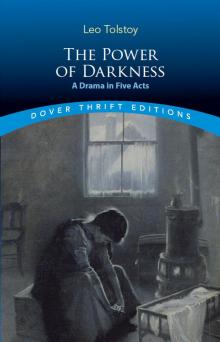 The Power of Darkness
The Power of Darkness Android Karenina
Android Karenina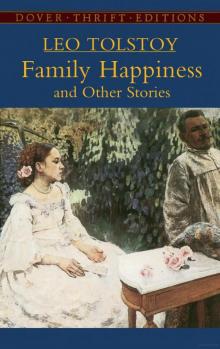 Family Happiness and Other Stories
Family Happiness and Other Stories The Lion and the Puppy
The Lion and the Puppy Collected Shorter Fiction, Volume 2
Collected Shorter Fiction, Volume 2 Collected Shorter Fiction, Volume 1
Collected Shorter Fiction, Volume 1